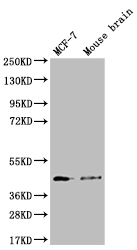The SLC27A4 monoclonal antibody was produced using thesynthesized peptide derived from human SLC27A4 protein as the immunogen. The cDNA was sequenced to obtain the DNA sequence of the SLC27A4 monoclonal antibody, and the gene was then cloned into a plasmid vector. The plasmid vector was transfected into the host cell using a suitable method. The resulting SLC27A4 recombinant monoclonal antibody was purified using affinity chromatography, and its specificity was tested in ELISA and WB. It can detect human and mouse SLC27A4 proteins.
The SLC27A4 protein, also known as FATP4, mainly transports long-chain fatty acids into cells. It is primarily expressed in the liver and small intestine. It plays a crucial role in lipid metabolism and homeostasis, as well as energy production. Mutations in the SLC27A4 gene have been linked to several metabolic disorders, including ichthyosis prematurity syndrome, a rare genetic disorder characterized by dry, scaly skin and respiratory problems.






